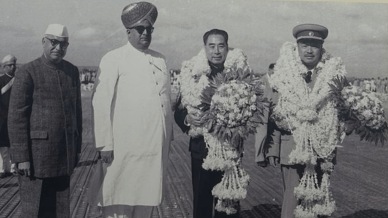Stay updated with the latest - Click here to follow us on Instagram
Exhibition pays tribute to last Maharaja of Mysore who played significant role in development of Bengaluru
“The contributions of this particular Maharaja have not been communicated to the larger public at all. He came at a very turbulent time in Indian history, when he took up the throne of Mysore in 1940,” says Maya Chandra, founder of MAYA Films.

Written by Ritisha Mitra
A photo exhibition on the last Maharaja of Mysore, Jaya Chamaraja Wadiyar, opened at the Indian Institute of World Culture in Bengaluru on July 19.
The exhibition showcases a total of 104 photos spanning from Maharaja Jaya Chamaraja Wadiyar’s early life, family, coronation, and alma mater to his ventures abroad and meetings with world leaders like Queen Elizabeth II, among others.
The photos and rare documents are curated by Maya Chandra, founder of MAYA Films, with the help of the Maharaja’s two daughters and their family archive which is home to over 500 such photos and documents which plot Indian history from the late 1800s to the post-Independence times.
“The contributions of this particular Maharaja have not been communicated to the larger public at all. He came at a very turbulent time in Indian history, when he took up the throne of Mysore in 1940. The Second World War had just started, Indian independence struggle went on simultaneously, as did the Unification Movement. In 1950, he became the first King to put down his title and throne to welcome the Republic,” says Maya Chandra.
The photos plot the development of Karnataka, especially Mysore and Bengaluru, as we know it today, and the men and women who made it all possible.
“The Maharaja’s contributions from the age of 21, when he inherited the throne to 50 years later are very many. Much of Bengaluru as we see it today including planning localities like Jayanagar and Rajajinagar were his brainchild.
“The Kanteerava Stadium was built by him and he even contributed to the inception of Hindustan Aeronautics Limited when in WW2, aircraft were coming to Bengaluru to be refurbished. He’s contributed not only to politics and governance, but also literature and music including composing 94 kritis of his own in Carnatic music and several books and publications on various aspects.
“This exhibition and everything we’ve found is still the tip of the iceberg. Today we don’t have a single tribute to him, and that is the tragedy of the Maharaja of Mysore. We plan to take this further to spread his legacy because a lot of what Bengaluru is today is because of him,” says Maya Chandra, adding that she wants to turn this exhibition into a travelling one.